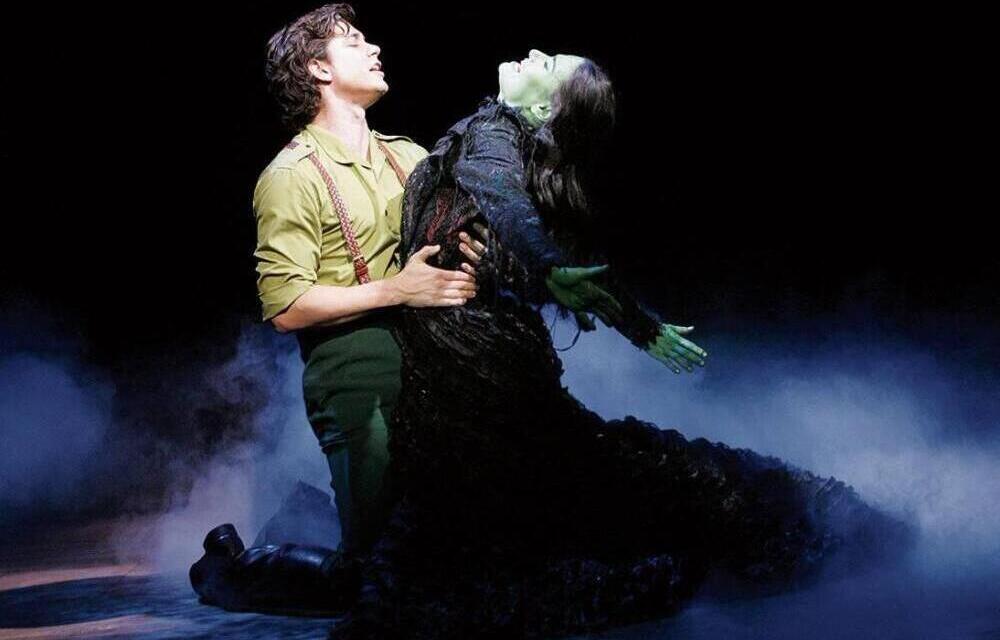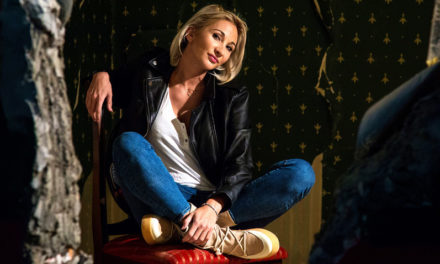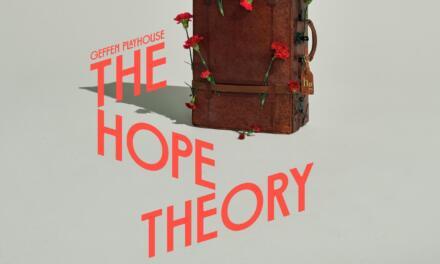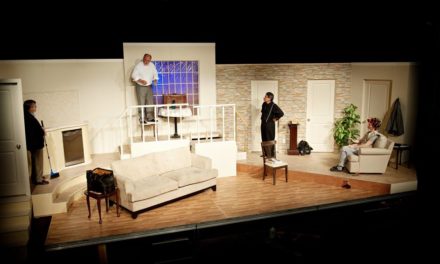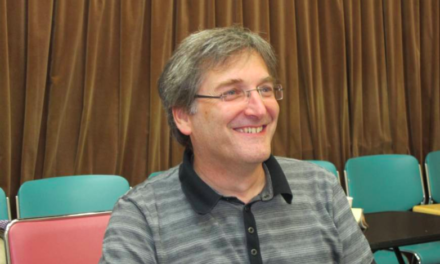The musical Wicked premiered on Broadway twenty years ago and quickly earned the title of the very “model of a modern musical.” With its contemporary form, vibe, and portrayal of the worldview and its perception, the show became extremely popular over the past decades.
Stephen Schwartz together with Winnie Holzman, inspired by the famous novel by Gregory Maguire The Life and Times of the Wicked Witch of the West, worked hard to create this brilliant adaptation of the novel which became the basis for the musical. It is important to note that they were able to preserve the originality of the literary work. But it was not just the novel that played its part in the show’s success. The history of the creation of the musical Wicked – may serve as a great example of a fruitful collaboration of creators and performers, the cast and crew, without which such masterpieces would not exist in the world of musical theatre. Winnie Holzman and Stephen Schwartz kept to very close cooperation during the process of writing songs, paying great attention to how the feelings of each character are being expressed through the music and lyrics. For instance, in the final duet of Elphaba and Glinda For Good, the authors were able to reflect the moral duplicity that is present throughout the whole script and score in general:
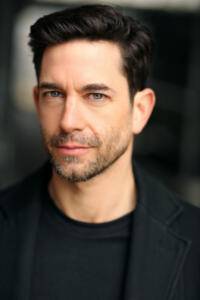
Adam Garcia, Photo Credit by Faye Thomas
“Because I Knew You
I Have Been Changed for Good.”
In the initial stage of the creation of a musical the participation and input of the performers who portray the lead characters is crucial. When Kristin Chenoweth and Idina Menzel – two extremely powerful vocalists joined the creative team, playing Glinda and Elphaba correspondingly, the two main characters transformed and the borders between them got blurred, compared to how things worked between them in the novel: Glinda as a character became just as important as Elphaba!
Adam and Lisa spoke about various transformations that the musical has undergone, as well as the main differences between the Broadway and West End productions. Adam not only was the original Fiyero on West End back in 2006 but also participated in one of the very first workshops of Wicked in New York! So, he knew he was meant to be Fiyero even before we all learned about the musical masterpiece known today as one of the longest-running Broadway shows.
LM: The musical Wicked is celebrating 20 years on Broadway. It opened on West End a little later, the show premiered on Broadway first and about three years later – on West End, which is where I saw you star as Fiyero.
AG: It’s been a minute…
LM: I loved you as Fiyero. I have seen several actors portray the role of Fiyero, including some of our Broadway performers, and you have always been my favorite. So how did it all begin for you? How did you get involved with Wicked? How did you turn into Fiyero?
AG: That is a good question. I was in New York, and I got a call from my US agent – Paul Martino, and he told me there was a workshop happening. I thought it was very cool and worked out perfectly since I was in New York anyway. Paul told me it was a Stephen Schwartz musical, and I was very excited about it. I knew of Idina [Idina Menzel] from Rent and I think I’d seen Joe Mantello’s [director of Wicked] show at the Roundabout. I went in, the workshop lasted for only three days, and I got to meet Stephen Remus. We went through the songs, and it was basically a table-read where we also workshopped some of the songs – I thought it was great. I thought it was a really interesting piece – it’s always hard to get a grasp of what something is simply off the page for a musical – with plays you can get more of an idea but with musicals – it’s just black and white on paper. I kind of thought nothing more of that after. And then they told me: “Listen, we’re going to go and do it!” in San Francisco, they wanted to start the process of putting the show on there and they wanted me to join the cast and do the part of Fiyero, but I had just gotten cast in the Lindsay Lohan film in Toronto… It was called Confessions of a Teenage Drama Queen. I felt that I couldn’t back out of Disney and so I had to say no to the original Fiyero. And that’s a bummer. But they had Norbert Leo Butz – and he did a pretty fine job!
LM: And then you got another chance!
AG: Yes. Joe Mantello said: “Listen, I can’t believe you’re turning this down. If this show ever comes to London, you have to promise me you’ll do it.” And I promised him. So, I was involved with Wicked quite early on, and, actually, a song that I sang back then was called Which Way Is the Party – it isn’t even in the show anymore. The workshop that I did was when they were reworking things and that song got turned into Dancing Through Life. And that’s a great song. I think there is one little bit left of that first song that Stephen Schwartz wanted to put in the show – Which Way Is the Party, and it’s the bit “Let’s go down to the Ozdust Ballroom…” – that bridge section from Dancing Through Life. Stephen wrote a completely new song which we know as Dancing Through Life today. And that was how I got on board!
LM: What did the workshop look like? Were you trying out different scenes and songs or going through the whole musical and putting it together like a puzzle?
AG: We did a table read of the script, and we just sang some of the songs – investors and producers wanted to hear them. I do remember Idina [Menzel] and Kristin [Chenoweth] singing the hell out of things and I was blown away. I have a vague recollection that the duet they sing at the end [For Good] was a slightly different incarnation of it at the time, but that was the moment I realized – it was a beautiful story about friendship. Not long after that I went and read the book. I didn’t get a chance to do it before the workshop. I was called in unexpectedly since I was in New York and wanted to participate but I didn’t even know the story at the time. When I read the novel, I thought it was very politically interesting and the concept of spin was there… I found it to be a fascinating book. But from what I remember it seemed like the creators of the musical were not doing “the book version” but something different. The show works well because it is about the two witches and their relationship. I think Winnie Holzman was fantastic in isolating that part of the story.
LM: Now that you’ve mentioned the book – it was my next question for you – how did you prepare for the role? Did you read the original The Wizard of Oz, and watch some of the movies? There was a 1939 movie, also a novel by Frank Baum The Wonderful Wizard of Oz. Did you like the fairytale as a child?
AG: The Wizard of Oz and particularly the Judy Garland movie, is a seminal piece of work – the Western culture has anchored itself to it. It defines so many things. The novel Wicked offers a completely different perspective. And each story always has two sides to it. So, I guess, knowing that in the novel Fiyero was a much darker character, more brooding, sort of like a “James Dean-rebel-without-a-cause type of guy –” there was still space to expand that inside the musical. When my wife saw the musical and I told her I did the workshop back in New York, she said: “Did they just take your character and make him a lush, vague, vain guy, with the main attitude “Whatever!?” Which was very much me at the time. Joe Mantello reinforced that, he said – “You don’t need to do much, because you’re a vague, slightly anti-authoritarian person and that’s kind of what Fiyero is.” He doesn’t care who people are and takes them as they are and that’s why he can’t fit into that world – it doesn’t matter to him in a good and a bad way.
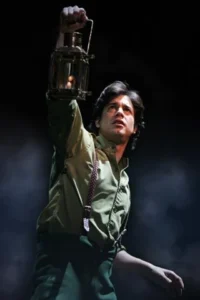
“Wicked” – Adam Garcia as Fiyero, Photo Credit by Tristram Kenton
LM: Fiyero changes throughout the show as a character. From the first time, we see him to the point where he turns into a Scarecrow. Which caught me by surprise.
AG: Right?
LM: I was a huge fan of The Wizard of Oz growing up and I would always want to play the role of the Tin Man or the Scarecrow. But I did not expect Fiyero to turn into the Scarecrow.
AG: It’s a big twist. Ray Bolger, who played the Scarecrow in the movie, was a dancer – I was always a huge admirer of his work and his physical ability. I think when the producers of the show were first interested in me, they took into account the fact that I am a dancer myself. Wayne Cilento [choreographer] wanted to make it into a big dancing piece in respect to that. There are many things I love about the show but besides the songs, the choreography that Wayne created in terms of a specific, new type of movement meant to express a world that isn’t our own – is remarkably successful. I remember watching it and thinking “I wish I could do that!” Dancing Through Life trails into the idea that Fiyero is of course the Scarecrow. Bolger made the role into one of the best dance pieces of all time. In terms of preparation, I watched Ray Bolger a lot and tried to move in such a manner and pick up on the characteristics particularly when he turns into a Scarecrow. You know, he’s a floppy, no-jointy, no-ligament guy.
LM: Why do you think Fiyero turns into a Scarecrow and not into a Tin Man for example?
AG: There are hints towards his brainlessness, his vagueness, his ambivalence towards things, and a Scarecrow has the world pass him by. And I think Fiyero is a similar sort of person… I won’t go into his backstory, but there is a reason why he protects himself with this attitude – because he is different. He feels different which is why he associates with Elphaba. He “gets her.” And when Elphaba says in her spell “…Let him feel no pain…:” men made out of straw don’t feel anything – they can be literally torn apart and put back together. The lyrics are so clever and how it all ties in.
LM: It is indeed a masterpiece of musical theatre in every way. We talked about the workshop, and you did mention that there were songs that changed or were not used in the show eventually. What were the main changes that came out of the workshop from what you’ve seen from the very beginning and ending with the final product that we see in the musical today?
AG: As brief as the workshop was, the main differences that I remember – the musical was a little darker, a bit more adult, a bit more like the novel in respect that it wouldn’t probably target everyone as the audience, where I think Wicked can target absolutely everyone. So, what I saw – they managed to make it look light, fluffy, and accessible, but the overall stakes are enormously high and in the workshop, I couldn’t work out the stakes. I didn’t know what was at stake. I learned from the novel, when I read it after, that the very nature of the people in this world is at stake, the lives are at stake! But that aspect didn’t come off the page for me back at the workshop. It seemed like a story of these three people trying to navigate their youth and responsibility. And when I finally saw the show, I realized it was about those two people’s relationship and how the world revolves around them in that respect. I’ve seen productions where the stakes have slightly been lowered by the performers. And it doesn’t work as well. I think for it to work the world needs to be at stake, everything needs to be at stake.
LM: Life or death.
AG: Yes. It is life or death. It is good vs evil, truth vs lies. All those things circling around the central characters. I couldn’t possibly have picked this all up in the workshop. I just thought the songs were great, the lead actresses were funny and amazing.
LM: And what about the music? There is a lot of information out there that the score would change throughout the process of creation, as it usually does, for example when such performers as Idina and Kristin joined the project, with their amazing talents and voices – the score was adjusted a little. Kristin, for example, put Glinda on the same level of importance as Elphaba thanks to her performance. Did anything change vocally, or musically for the main characters in the show in a similar fashion? Was anything adjusted by the composer to match or emphasize a certain vocal quality of the performer – in Fiyero’s case, for you?
AG: I don’t know. I know that once Norbert came on board, he added that rocky quality to it, he can sing everything, and of course, I love his voice. And the song that I workshopped Which Way Is the Party was much more of a crooner type of song, it was much more loungy, which I guess suits my style of voice. I’m not a full legitimate tenor, I’m much more of a bass-baritone-tenor and it was much more of a crooner, Vegas-y and laid-back piece. Dancing Through Life does have that crooniness to it too, which I love. I don’t know. When I came back on board, I’ve just discovered that the song was changed. I remember seeing interviews where Stephen said that because of Idina and because of Kristin he had to use the new tools from his toolbox where he listened to how their voices intonate and craft the story vocally and implemented those adjustments – Idina is one of the best vocal storytellers, which is why Frozen works. She envelopes you in her voice. And to this day No Good Deed and The Wizard and I – are two of my most favorite songs from the show. And the way they are structured, it sounds like Idina, and I would imagine when Stephen Schwartz heard her sing those two songs he happily accepted and implemented her take on those two songs.
LM: I remember reading a quote by Stephen Schwartz: “One is trying to embody the emotion of a character through the feeling of the music.” Just as you mentioned – telling the story of your character through a song, through the performance of it. So, in your arias, when you were rehearsing them, and later performing them, what did you do? How did you play with various vocal styles, the range you used, or what acting tricks did you use to portray the feelings of your character in the show?
AG: The two songs that Fiyero sings – the main ones – Dancing Through Life and As Long As You’re Mine – are very different. One is a croony, show-off song, which is great fun, it’s disruptive and all those sorts of things and with the choreography that Wayne did and Joe’s phenomenal directing – it’s fantastic and yet the plot of those songs is pretty simple. As Long As You’re Mine was a song that was a challenge for me vocally. It started so high, and I doubted I’d ever be able to sing it… And during rehearsals, Joe would tell me: “This is a song about making love…,” he wanted it to be very passionate. And, of course, I wasn’t allowed to move, we had to kneel and stay in one spot, and touch each other’s hands – and that was a challenge since that is what normally does not happen during lovemaking. So that number was a much harder process than Dancing Through Life, which was just a good old musical theatre number. The easiest thing I could always anchor myself on once I was in performance was – I had Idina and then Kerry Ellis truly singing at me, which was great, and they are such committed performers – it’s really easy to fall in love with them in that song and be inside that relationship. The two characters are very different – one is a show-off and a total extrovert, and the other one – is an introvert, they are placed in a bubble, which is created with the help of light and smoke. And you are there, in a tiny spot on the stage, you don’t walk around, you sit there, and it is their 2-meter bubble – for Fiyero and Elphaba, that they exist in for that moment in the song. I had that in mind – it was a very private song to sing and that’s what I used to guide me in that number.
LM: I think I saw Kerry Ellis when I saw your performance on West End. She was very gentle, more so than Idina was.
AG: Yes, I don’t think you can disguise who you are in that role, with Elphaba there is so much that inevitably comes through with your own personality. And Kerry is a very chilled, serene person. Not that Idina isn’t. They are just different – and their different personalities shine through.
LM: When you were working on Fiyero as an actor, what qualities would you say Fiyero has that are close to you – Adam, and what qualities are far from your personality?
AG: I may have answered this already, but Fiyero that I recognized when I read it all and started sort of putting it together – I think the qualities that I liked and recognized in him and that I like and recognize in myself are as follows: he is not judgmental, he doesn’t have natural biases, he feels different, and that’s a quality that I feel makes him… not freakish – that would be Elphaba, but just a little detached. That’s a good and bad personality trait that I share with Fiyero. There’s a detachment and it’s both sort of a natural protection and the feeling of “Well, life’s great! Let’s cruise through it.” I’ve always described myself as plankton: I don’t really have any control over where the world takes me and I’m absolutely ok with that. There are far more powerful currents pulling me around the world that I could possibly be in control of. And that resonated with me in Fiyero. The things that I couldn’t connect with – there weren’t that many because even when he gets married and he thinks he is doing the right thing and then realizes that’s a mistake, he gets locked into a cycle of injustice, I guess that would be the best way to put it, with someone that he cares about, with Glinda. That feeling of being trapped inside a machine larger than yourself – I can sort of resonate with that as well. I like environmentalism, I’m quite liberal in that respect and I find those sorts of injustices very frustrating. So, I think overall I’m a lot like Fiyero.
LM: If you had to choose out of all the songs in the musical Wicked which one is the “hit song” in your opinion?
AG: That’s a tough choice. I’m tempted to say, Defying Gravity, but also For Good – I just think there’s something so beautiful about this duet, the song is not simple but there is sort of a simplicity to it, so I think For Good is the number that emotionally ties the whole thing up and is incredible satisfying. For Good is my hit.
LM: I agree. That would be my favorite song – message-wise… Defying Gravity of course blows you away.
AG: I was so impressed when I heard that song first. As you said, the show is a masterpiece because of how it’s crafted, and how it leads the audience exactly where it wants to lead the audience, it’s remarkable. Like the book, it’s irresistible. Resistance is futile.
LM: Absolutely, you can’t resist a show like this one. Now, trick question – if in reality you, as Adam, not Fiyero… if you would have met two ladies like Elphaba and Glinda – which one would you choose?
AG: It’s Elphaba for me. Let’s face it, I always like a weirdo.
LM: The show has become the fourth longest-running show on Broadway, the musical Wicked is celebrating its 20th anniversary. What do you think is the secret of Wicked’s success?
AG: If you look past the fact that musically and creatively it’s stunning, and visually all the aspects of it create a completely new world, it’s always about that message of friendship and about the people who are pushed to the side, marginalized, it gives hope and fight to those people, it’s about acceptance, fighting for equality, fighting for your voice to be heard. And I think that’s why so many people love this show – because it calls to them in that respect and brings to them that message – unless something miraculous happens in our world – there will always be people who are marginalized, unheard, ostracized, divided – all of those things. So, I think this musical can connect with people. And that’s the true magic of the show.
LM: You pretty much already answered my next question which was – what was the main message of the show?
AG: It could be that or – if you are the guy in a love triangle, you’re probably going to end up dead or as a Scarecrow. If you’re in a love triangle between two best friends, you’re probably better off being a Scarecrow. (laughs)
LM: Especially if they are both powerful witches – you don’t want to come between them. Now, there is a movie version of the musical Wicked currently in the works, and I know that Stephen Schwartz spends a lot of time on set. Everyone is extremely excited to see the movie premiere. What do you know about this upcoming movie? How do you feel about it? Are you excited about it too? Are you going to go see it at a movie theatre?
AG: I can’t believe, now that I’m fifty, that I could have played Fiyero Tigelaar, a young Winkie Prince – it seems unbelievable to me. I’m excited! I met up with Stephen Remus a couple of times, he is doing the musical supervision for it. I’m also a big Ariana Grande fan – she’s got a phenomenal voice and a fantastic range – I think she’d be an amazing Glinda. They’ve kept it really under wraps and, when I met up with Stephen, he made me promise not to ask him anything. I only know that they built a complete sound studio where the orchestra can be literally vacuum-sealed. I’m as in the dark as anyone else and I don’t mind it that way, much like when I saw the musical for the first time – other than being in the workshop – I didn’t know what it was going to be, and it was an incredible surprise – I want this to be a surprise as well. Even though I’m so intimate with the story, the process, and all of it. I’ll definitely watch the movie.
LM: I always ask this question – what are some of the roles in musical theatre that you haven’t played yet that you’d love to play, that are on your bucket list? Out of the existing ones or the musicals that are yet to be written?
AG: Star Wars the musical – I’d play Jabba the Hutt… All jokes aside, the thing that made me want to do musical theatre was seeing Little Shop of Horrors, which is brilliant and of course, everyone wants to play the dentist. And one of the first musicals I ever saw was… my dad didn’t know much about musical theatre but he wanted me to dance, so he took me to see things – he took me to see The Rocky Horror Picture Show and I was ten at the time… That was a real eye-opener. The actor who played Frank-N-Furter swore so much… That’s when I realized – “That’s what I want to do! Curse at the audience and be a transvestite.” So, I would love to play Frank-N-Furter one day.
LM: I would love to see that! Do you have any shows coming up, that you are in rehearsals for right now?
AG: I just did 42nd Street and I’ll be going back to that at the end of the year when it goes to Toronto. And I am directing and choreographing a show which is called The Emerald Storm at the moment, which is about to go on tour around the UK. There is also a film which I shot last year called The Performance which is about vaudeville performers going to Germany in 1936 – “what can possibly go wrong?” (laughs)
LM: Out of all the characters that you’ve played – be it on stage or in the movies which ones are your favorites?
AG: Well, I’m going to have to say Fiyero, it truly was an amazing time! I did love doing Kiss Me, Kate, playing Bill Calhoun – he’s another sort of Fiyero-type character, he’s just a bit all about himself and Tony Manero from Saturday Night Fever, who also…. Hmm, there seems to be a pattern here. (laughs) I’ve done some memorable parts, I’ve been in Coyote Ugly and other movies, but there is something truly special when you’re playing a character live on stage for like a year. You really do get to know them. So, “because I knew Fiyero, I have been changed for good…”
The tremendous success of the show led to numerous national tours, and various international productions, including the one on West End. The musical won three Tony Awards, one Grammy Award, and the Laurence Olivier Award among others. Twenty years of continuous performances (which closed only during the pandemic), make Wicked one of the longest-running shows in the history of Broadway musicals.
This post was written by the author in their personal capacity.The opinions expressed in this article are the author’s own and do not reflect the view of The Theatre Times, their staff or collaborators.
This post was written by Lisa Monde.
The views expressed here belong to the author and do not necessarily reflect our views and opinions.

